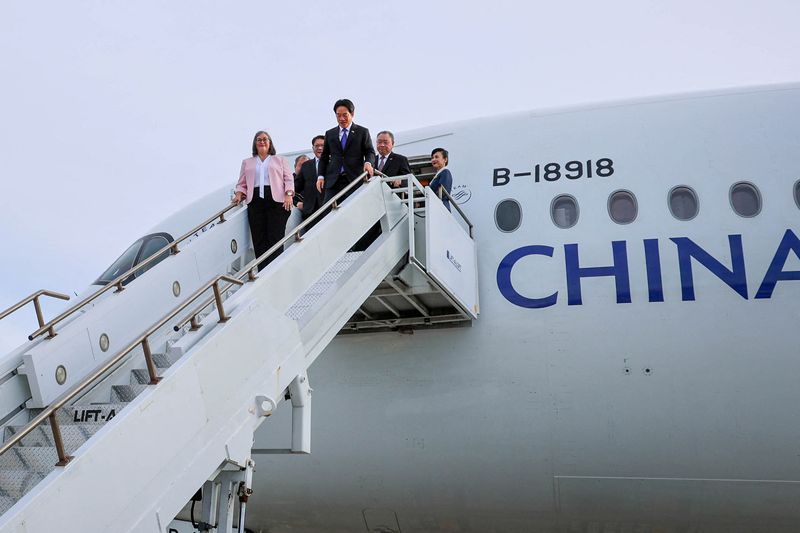(Reuters) -Taiwan President Lai Ching-te was in the U.S. territory of Guam on Wednesday, his second U.S. stopover in less than a week during a tour to reinforce ties with Pacific allies in the face of increasing Chinese pressure.
Lai arrived from Tuvalu and will stay in Guam one night before heading to Palau and returning to Taipei on Friday.
Lai was welcomed in Guam by Ingrid Larson, Washington office managing director of the American Institute in Taiwan, the body that serves as the unofficial U.S. embassy in Taiwan.
Lai was also greeted by Guam Governor Lou Leon Guerrero, who called it an "an honor" to see him on what is his first overseas trip since taking office in May.
Lai stopped in Hawaii at the weekend, before heading on to the Marshall Islands and Tuvalu, like Palau among 12 countries that retain formal diplomatic ties with Taipei and a part of the world where China has been exerting stronger influence.
While it has only unofficial relations with Taiwan and follows a "one-China" policy under which it recognizes Beijing diplomatically, the U.S. government is obliged by law to supply the island with the means to defend itself.
It has also often facilitated what are described as unofficial stopovers when Taiwanese leaders visit far-flung allies in the Pacific, Latin America or the Caribbean.
HIGH-TECH INDUSTRY
In a speech in Hawaii, Lai said Taiwan's U.S. partnership was a source of strength for the high-tech industry, including the semiconductor sector, and showed Taiwan was a trusted and reliable partner.
Taiwan is a major producer of chips used in everything from cars to AI applications and is home to key Apple (NASDAQ:AAPL) and Nvidia (NASDAQ:NVDA) supplier TSMC.
U.S. President-elect Donald Trump criticised Taiwan during his election campaign, however, accusing it of stealing business from U.S. semiconductor companies. His threat of broad import tariffs could affect an industry crucial to Taiwan's economy.
China, which considers Taiwan its own territory and Lai a dangerous separatist, opposes any foreign interactions or visits by the island's leaders.
It stepped up military pressure against Taiwan, including two rounds of war games this year and on Friday urged Washington to exercise "utmost caution" in its relations with Taiwan.
Tuvalu Prime Minister Feleti Teo reaffirmed ties with Taiwan after he was elected in February, and travelled to Taipei to meet Lai for Taiwan's national day celebrations in October.
"Different countries, the same belief in democracy; different time zones, the same air of freedom," Lai wrote on Facebook (NASDAQ:META) after his welcome in Tuvalu.

With a population of 11,000 scattered across nine low-lying atolls, and predictions that half of its main town will be submerged by rising tides by 2050, Tuvalu is reliant on donors including Taiwan to fortify its coast.
It will also be connected to international telecommunications by a subsea cable for the first time in a joint project backed by Taiwan, Australia, the United States and Japan.